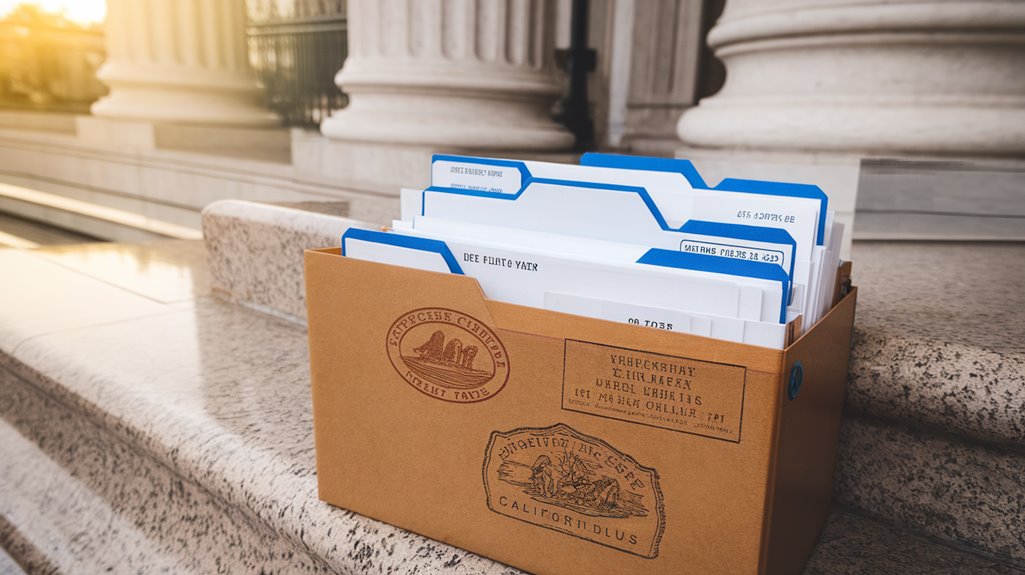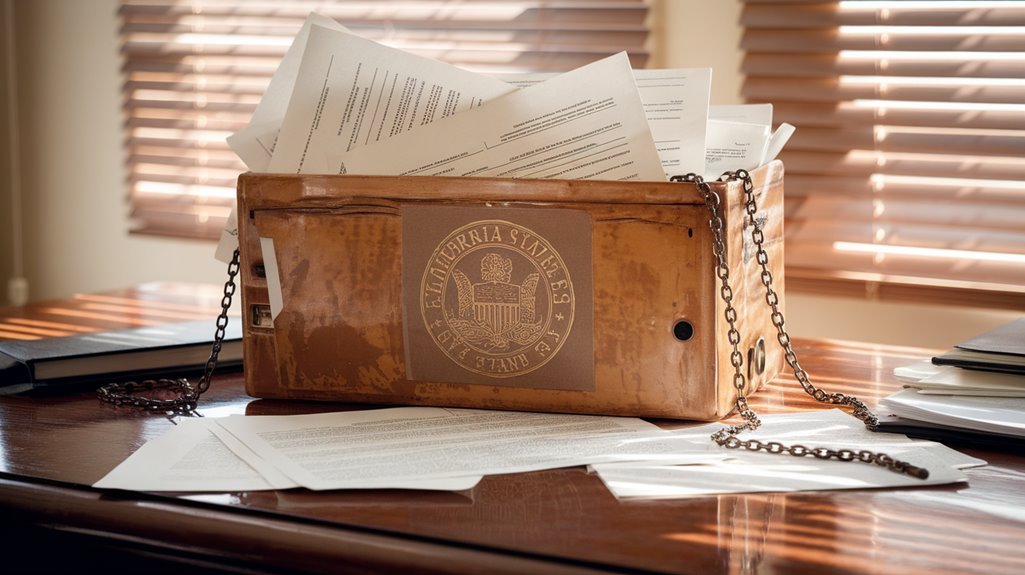California law allows individuals to clear both acquitted and dismissed criminal cases from their records. The process requires filing specific forms with the court where the case occurred. Acquitted cases need a 1-3 year waiting period, while dismissed misdemeanors can request immediate sealing. Basic filing fees range from $50-$500, with fee waivers available for financial hardship. Legal aid and public defenders can help navigate the complex requirements and documentation needed for successful record clearing.
Key Takeaways
- Acquitted cases can request sealing after one year for misdemeanors and three years for felonies in California.
- Dismissed misdemeanors are eligible for immediate sealing upon dismissal through petition filing at the local county court.
- Required documentation includes arrest details, court orders showing dismissal/acquittal, and evidence proving factual innocence.
- Filing fees range from $50-$500, with fee waivers available for those experiencing financial hardship.
- Form CR-409 must be completed accurately with case numbers and dates, submitted to the court where conviction occurred.
Understanding California's Record Clearing Laws

While California offers several paths to clear criminal records, the process follows specific legal frameworks. The main law governing expungements is Penal Code §1203.4, but recent legislation like SB 731 and SB 1260 has expanded eligibility options.
Common legal misconceptions about record clearing include the idea of complete erasure. In reality, California does not offer true expungement. Records remain accessible but are sealed from public view, with specific restrictions on employment disclosures. The system distinguishes between sealing arrest records and expunging convictions.
State-level relief has limitations. It doesn't impact federal database access or restore firearm rights. Relief options vary based on offense type, with violent felonies and sex offenses facing stricter restrictions. Courts consider both rehabilitation evidence and public safety concerns.
Key Eligibility Requirements for Record Clearing
California's record clearing process requires completing probation and having no current criminal charges or sentences. Most felonies and misdemeanors qualify for relief, except serious violent offenses and sex crimes requiring registration. The courts review each case based on specific eligibility standards, including whether the person served prison time and their overall rehabilitation progress.
Probation Completion Standards
The path to clearing criminal records in California starts with meeting probation completion standards. The probation eligibility criteria require individuals to successfully complete all assigned programs and court-ordered conditions. This includes paying fines, making restitution, and finishing community service hours.
The probation monitoring processes verify that individuals maintain a clear record with no new criminal charges. For non-probation cases, applicants must wait 12 months after judgment. Those with felonies on probation face a longer timeline, requiring a four-year waiting period after supervision ends for automatic sealing. Once probation terms are met, records become eligible for dismissal. Staying compliant with all requirements throughout the supervision period is essential for successful record clearing.
Qualifying Case Types
Record clearing eligibility varies based on case type and outcome. For acquitted cases, individuals can seek sealing after one year for misdemeanors and three years for felonies under PC 851.85. Those with dismissed misdemeanors may request immediate sealing upon dismissal.
Case eligibility for record clearing requires meeting specific conditions. Petitioners must complete probation, have no pending charges, and fulfill all court orders like restitution payments. The sealing process differs between felonies and misdemeanors, with Orange County offering same-day sealing for dismissed misdemeanors. Certain cases are excluded from automatic clearing, including violent crimes, serious felonies, and dismissals due to inadmissible evidence. Judges consider factors like rehabilitation progress and employment impact when evaluating sealing requests.
Mandatory Exclusion Rules
Understanding who qualifies for record clearing starts with mandatory exclusion rules. California law sets strict case exemptions that prevent certain offenses from being sealed or cleared. These mandatory exclusions protect public safety while allowing rehabilitation for eligible cases.
| Offense Type | Exclusion Status | Legal Basis |
|---|---|---|
| Sex Crimes | Not Eligible | PC 290 Registration |
| Violent Felonies | Not Eligible | PC 1170.12 |
| Domestic Violence | Limited Eligibility | Post-2023 Rules |
| Firearms Offenses | Not Eligible | PC 29800 |
Key mandatory exclusions include serious violent crimes like murder, rape, and torture. Cases involving sex offender registration cannot be sealed. Recent domestic violence convictions require completed probation. Gun possession felonies remain permanently ineligible. DUI "wet reckless" convictions face restrictions even with acquittals.
Types of Cases Eligible for Expungement
California law allows expungement for most non-violent misdemeanors and certain felonies after probation completion. Cases resulting in acquittal or dismissal are prime candidates for record clearing, with courts typically favoring these requests. Recent changes have expanded eligibility to include many domestic violence cases and some prison sentences, though serious violent crimes remain ineligible.
Acquittal and Dismissal Criteria
When seeking an expungement in California, certain cases qualify for dismissal while others do not. A key factor in the acquittal process is the successful completion of probation requirements. Courts look closely at whether all probation terms have been fulfilled before considering dismissal.
The dismissal implications depend heavily on meeting these requirements. Defendants must either complete their full probation period or receive early termination from the court. This is a fundamental step that cannot be bypassed. The court will verify that all conditions were met, including any mandatory programs, fines, or community service hours.
Without completing probation, the chances of having a case dismissed are severely limited. This requirement applies regardless of the original charge or conviction type.
Non-Violent Record Clearance
Many non-violent offenses qualify for expungement under California law. The process involves record sealing for eligible cases, with legal implications that can benefit employment opportunities. Individuals must complete probation and not face current charges to qualify.
| Offense Type | Eligibility | Timeline |
|---|---|---|
| Misdemeanors | Most eligible | 90-120 days |
| Low-level Felonies | Case-by-case | 90-120 days |
| Drug Offenses | With diversion | 90-120 days |
| Dismissed Cases | Automatic | Immediate |
| Prop 47 Cases | If qualified | 90-120 days |
Eligible offenses include theft, drug possession, and non-violent burglary. DUI cases require special court approval. The process excludes violent felonies, serious sex offenses, and crimes requiring sex offender registration. Federal and out-of-state convictions remain ineligible for California expungement. Individuals seeking expungement should be aware that certain conditions must be met, such as completing their sentence, including any probation requirements. Additionally, repeat offenders, especially those facing house arrest for fifth DUI charges, may find it particularly challenging to qualify for expungement. It’s essential for applicants to understand the specific eligibility criteria and seek legal advice to navigate this complex process effectively. Individuals seeking expungement must also meet specific criteria, such as completing their probation and having no pending charges. Additionally, those with DUI convictions may explore house arrest alternatives for DUI, which can provide a more flexible sentencing option while still addressing public safety concerns. It’s essential for applicants to understand these requirements and consult with legal counsel to navigate the expungement process effectively.
Required Documentation and Forms

Several key forms must be filed to request a California criminal record dismissal. The main form requirements include the Petition for Dismissal (CR-180) and Order for Dismissal (CR-181). For cases involving factual innocence, the BCIA 8270 form is needed to seal and destroy records.
Document examples vary by county, as local courts often have specific requirements. Low-income applicants can submit fee waiver forms with proof of income to avoid the $120 filing cost. All paperwork needs notarized signatures and proper service to district attorneys and probation departments. Courts may charge fees for criminal record copies, though waivers exist for financial hardship cases. Free expungement clinics through legal aid organizations can help with form completion and submission.
The Role of Clean Slate Programs
California's Clean Slate programs provide automatic record relief for eligible individuals. These programs benefit people with misdemeanors and nonviolent felonies by sealing their records once they complete all court requirements. Arrests without convictions also qualify for automatic sealing.
The clean slate process works through monthly Department of Justice database reviews. The system identifies eligible cases and notifies courts and district attorneys, who have 90 days to challenge the relief. Program benefits include not having to disclose sealed records for most jobs and housing applications.
Some cases still need manual filing, including out-of-state records and pre-2023 cases. Violent offenses, sex crimes, and cases requiring sex offender registration remain ineligible for automatic relief under these programs.
Step-by-Step Petition Filing Process

The petition filing process begins with gathering all essential documentation, including court records and proof of eligibility. Forms like CR-409 must be filled out completely and accurately, with special attention to details such as case numbers and dates. Once submitted to the appropriate court, petitioners should maintain copies of all documents and track their case status through the court system.
Gather Required Documentation First
Successful petition filing starts with gathering all required documents. Proper document organization and evidence collection are essential before submitting any requests. The petitioner must compile arrest records, court orders, and proof of factual innocence.
| Required Item | Purpose |
|---|---|
| Arrest Details | Provides date, location, charges |
| Court Orders | Shows dismissal or acquittal |
| Evidence | Proves factual innocence |
| Service Records | Documents proper notification |
| Timeline | Establishes eligibility |
Petitioners must use official forms like SDSC CRM-221 for initial submissions. Law enforcement agencies require specific documentation based on case type. For San Diego cases, misdemeanors go to the City Attorney while felonies go to the District Attorney. All supporting materials must be certified copies when possible.
Complete Forms With Precision
Precise form completion represents the most critical step in the petition filing process. The CR-180 Petition for Dismissal must include accurate case numbers and conviction dates from official records. Form accuracy depends on matching details exactly with FBI and state DOJ documentation.
Key petition tips include using the legal name from the time of conviction consistently across all paperwork, even if it has changed. Supporting documents strengthen discretionary dismissal requests – rehabilitation proof like education records or therapy completion certificates should be attached. For multiple cases, separate forms are needed for each petition, though they can be filed concurrently. The CR-181 Order for Dismissal should remain blank, as this will be completed by the court upon approval.
Submit and Track Progress
After completing all necessary forms, petitioners must follow specific steps to file and monitor their criminal record dismissal requests. The process begins with submitting paperwork to the local county court where the conviction occurred. Regular case tracking and petition updates help guarantee smooth processing.
| Filing Step | Required Action | Timeline |
|---|---|---|
| Initial Filing | Submit forms at courthouse | Day 1 |
| Processing | Court reviews documents | 1-2 weeks |
| Legal Review | DA examines petition | 2-3 weeks |
| Court Date | Attend hearing if required | 2-3 months |
| Final Decision | Receive court's ruling | 4-5 months |
Working with an attorney can improve success rates and help navigate potential delays. Most cases take 4-5 months for completion, though court backlogs may extend this timeline. Petitioners should maintain copies of all submitted documents for reference. Additionally, having legal representation can provide insight into complex litigation strategies in Bay Area courts, which are often unfamiliar to those without legal training. An experienced attorney can also advocate effectively on behalf of their clients, addressing any unforeseen challenges that may arise during the process. Overall, engaging a knowledgeable attorney not only streamlines the proceedings but also significantly enhances the chances of a favorable outcome.
Working With Legal Aid Organizations

Legal aid organizations play an essential role in helping Californians clear their criminal records. These community resources provide guidance through the complex expungement process, particularly for dismissed or acquitted cases. Organizations like LAFLA and New Way of Life Reentry Project offer free services to eligible individuals.
Key services provided by legal aid groups include:
- RAP sheet retrieval and eligibility assessment
- Petition preparation and court filing assistance
- Post-expungement guidance for employment and housing matters
Public defenders and nonprofit legal clinics help clients understand their rights under the California Fair Chance Act. Most services are available at no cost, though each organization may have different eligibility requirements. The process typically takes 2-6 weeks, with legal aid groups handling the paperwork and court appearances on behalf of their clients.
Cost Considerations and Fee Waivers
The cost of clearing criminal records in California ranges from $50 to $500 in basic court filing fees, with additional attorney fees typically between $425 and $1,200. Those facing financial hardship may qualify for fee waivers under state guidelines by providing proof of income and other documentation. Public defenders can offer free or low-cost assistance for eligible cases, though specialized services like juvenile record sealing have fixed fees starting at $3,500.
Standard Filing Fees
Filing fees for California criminal records vary dramatically by county and case type. The regional fee differences range from $0 in counties like Alameda and San Francisco to $240 in Solano County. These filing fee disparities often reflect local jurisdictional policies rather than standardized state guidelines.
- Felony cases typically cost more than misdemeanors (San Diego: $120 for felonies, $60 for misdemeanors)
- Cases involving probation may incur higher fees (Sacramento: $120 with probation, $60 without)
- Administrative processing adds a universal $150 fee across jurisdictions
Some counties maintain tiered systems based on offense severity, while others charge flat rates. Notable exceptions include Mono County, which charges no fees, and Santa Clara County, which implements a consistent $150 fee regardless of case type.
Financial Hardship Assistance
Financial barriers should not prevent Californians from clearing their criminal records. Several programs offer cost-saving options and financial aid for those seeking record relief.
The Orange County Public Defender's Clean Slate Program provides free legal support for record clearing. Under AB 1076, many cases qualify for automatic relief without court filing fees. This includes arrests without convictions and eligible misdemeanors. The Public Defender's office helps reduce costs through free expungement services.
For those facing hardship, programs like CalFresh and CalWORKS remain accessible even with DUI convictions. Medi-Cal eligibility typically continues unless drug-related felonies are involved. Alternative funding sources, including private scholarships and state programs, can replace federal aid when needed. These options guarantee that financial constraints don't block access to record clearing services.
Public Defender Costs
While California law requires public defender services to be available, many counties still charge registration fees. These fees can create public defender challenges for those facing criminal charges. Though state law caps fees at $50 for adults and $25 for juveniles, fee waiver implications vary by county.
- Most California counties charge $50 registration fees, but some like San Francisco have eliminated them
- Courts must assess ability to pay after case resolution for cost recovery
- Several counties including Los Angeles and Santa Barbara stopped charging fees after finding they deterred people from seeking legal help
The system aims to balance access to legal representation with cost recovery. Some counties maintain strict fee requirements, while others prioritize constitutional rights by waiving fees for those who cannot afford them.
Timeframes for Record Clearing
Recent changes to California law have simplified record clearing timelines. The process shows significant timeframes variability based on case type and court workload. Misdemeanor expungements typically process within 30-120 days, while felony cases take longer.
| Case Type | Processing Time | Requirements |
|---|---|---|
| Dismissed Cases | Immediate | Court Order |
| Misdemeanor Arrests | 1 Year | No Charges Filed |
| Felony Arrests | 3 Years | Charges Dropped |
Expedited processes apply to certain situations. Dismissed cases receive immediate clearance under SB-731. Non-violent felony convictions clear after 4 years post-closure. Courts typically respond to petitions within 5 months, with prosecutors having 15 days to object. Case complexity and court backlog remain key factors affecting completion times.
Impact on Employment Opportunities

California's record clearing laws create important employment protections for job seekers with criminal histories. The state addresses common legal misconceptions by limiting how employers can use criminal records in hiring. Ban-the-box laws delay background checks until after basic qualifications are met, reducing employment barriers.
Key protections for job seekers include:
- Employers cannot consider expunged convictions or arrests without conviction
- Background checks cannot show convictions older than seven years
- Employers must conduct individual assessments weighing offense severity against job duties
While some industries like healthcare and security maintain stricter screening requirements, most employers must follow fair chance hiring practices. Certificates of rehabilitation provide additional proof of reform, helping qualified candidates overcome past records when seeking employment.
Special Considerations for Professional Licensing
Professional licensing in California underwent major changes with AB-2138. The law limits how licensing boards can use criminal records when reviewing applications. After July 1, 2020, boards cannot deny licenses based on convictions over seven years old unless directly related to the occupation.
The licensing implications of past convictions now depend heavily on rehabilitation assessments. Applicants can submit certificates of rehabilitation, employer references, and treatment records to show their fitness for licensure. Boards must provide written explanations when denying applications based on criminal history. They need to prove a direct connection between the conviction and professional duties.
The law covers 37 Department of Consumer Affairs boards but excludes some agencies like the superintendent of public instruction and contracting boards.
Rights and Limitations After Expungement

Beyond professional licensing concerns, expungement offers a fresh start for those with criminal records. After completing probation terms and resolving court obligations, individuals can pursue post expungement opportunities. They must verify no open cases exist and meet eligibility requirements before proceeding.
Expungement creates new opportunities by clearing criminal records after meeting probation requirements and resolving all court-mandated obligations. This process allows individuals to pursue employment, housing, and educational opportunities without the burden of a past conviction. Understanding how to expunge a criminal record is essential for those seeking a fresh start, as the requirements and procedures vary by state. Seeking legal guidance can help navigate the steps involved and ensure all necessary documents are properly filed.
Common expungement challenges include:
- Meeting all financial obligations like fines and restitution before qualifying
- Documenting completion of community service and probation requirements
- Guiding through restrictions for state prison sentences unless covered by Proposition 47
While expungement brings relief, some limitations remain. State prison convictions generally face more hurdles than local confinements. Direct court dismissals work differently for acquitted cases versus dismissed ones. Understanding these distinctions helps individuals set realistic expectations about their rights after expungement.
Handling Multiple Case Records
Managing multiple criminal case records requires careful attention to detail and organization. The key to successful case retrieval strategies lies in gathering essential information like case numbers and filing dates before starting the process. Courts maintain permanent indexes, but accessing them varies by county.
Record organization tips include creating separate files for each case and tracking court locations where records are stored. For cases before 1989, individuals must visit courthouses to search microfiche records. Modern cases can be tracked through online platforms, though fees may apply. Sacramento County charges $15 per case search or $40 for certified searches.
Third-party databases present additional challenges, as expunged records may still appear in non-court systems. Individuals must actively notify reporting agencies to update their records after expungement.
Common Obstacles and Solutions

Seeking to clear criminal records in California often hits roadblocks. Record sealing faces several procedural hurdles that can slow down or derail the process. Courts have different requirements, and legal terminology can be confusing for those filing without an attorney. Additionally, individuals seeking to understand their options may benefit from a sealed investigations overview, which outlines the procedures and eligibility criteria for record sealing. Acquainting oneself with this overview can provide clarity and guidance, helping applicants navigate the complexities of the legal system. Without proper knowledge and support, many may find themselves stuck in a labyrinth of paperwork and legal jargon.
Common obstacles people face when clearing records:
- Varying court requirements for filing forms and documents across different counties
- Confusion about eligibility criteria, especially for cases involving felonies or prison time
- Time-based conditions under SB-731 that must be met before automatic relief kicks in
Understanding these challenges helps people prepare better. Some cases may need legal help, especially when dealing with multiple convictions or serious offenses. Simple misdemeanors typically face fewer obstacles than felony cases. Several individuals underestimate the complexities involved in navigating the legal system, often leading to what are considered the biggest legal mistakes after arrest. For instance, failing to seek adequate legal representation can result in harsher penalties or missed opportunities for reduced charges. Additionally, making impulsive decisions without fully understanding one’s rights can have lasting repercussions in court.
Resources for Additional Support
Several resources exist to help Californians navigate the record clearance process. The California Courts Self Help Guide offers detailed information about eligibility and procedures. Legal aid is available through LawHelpCA.org's free hotline for low-income residents who need help with paperwork.
Community resources include local legal clinics and Public Defender Programs. Santa Clara County hosts record clearance fairs, while Humboldt County provides reentry services. Many counties offer fee waivers to reduce financial barriers. The Public Defender's offices in various counties maintain helpful forms and templates online.
For those seeking automated clearance under the Clean Slate Act, county probation departments can explain eligibility and waiting periods. Local court websites also provide necessary forms and step-by-step guides for both manual and automatic record clearing processes.
Frequently Asked Questions
Can Immigration Authorities Still Access My Expunged Records?
Yes, federal immigration authorities can still access expunged records. The expungement process at the state level doesn't prevent agencies like USCIS and DHS from viewing these records. While expungement limits public access, federal immigration implications remain unchanged. Anyone dealing with immigration matters must disclose all criminal history, including expunged cases. Failing to do so could result in serious consequences for visa, green card, or citizenship applications.
What Happens if I Move to Another State After Expungement?
Like a bird's migration path that crosses multiple territories, expungement benefits don't automatically fly across state lines. When someone moves to a new state after California expungement, interstate legal implications come into play. The original state's expungement may not be recognized. New states might still see the records. Local employers could require disclosure. Each state has different rules. For complete protection, they may need to seek expungement in their new home state.
How Do Social Media Background Checks Handle Expunged Records?
Social media background checks may still reveal expunged records due to cached content and third-party data sharing. Most social media policies don't automatically remove old posts or images referencing arrests or court cases. Background check implications remain complex since employers using social media screening might discover expunged information through shares, comments, or archived content. Manual content removal requests to platforms and careful online reputation management are often necessary to protect expunged status.
Will Expungement Affect My Existing Security Clearance Status?
While some might assume expungement magically erases their past, existing security clearance holders face a different reality. The expungement process doesn't automatically impact current clearance status, but holders must report it to their security officer. Failing to disclose can be worse than the expunged offense itself. Most clearance holders maintain their status if they're upfront about the expungement, though each case gets reviewed individually.
Can DNA Records From an Expunged Case Be Removed From Databases?
Yes, DNA records from expunged cases can be removed from databases. When a court orders expungement, DNA retention policies require removal of profiles from both CODIS and NDIS systems within 60 days. Database regulations mandate that physical samples must be destroyed and searchable profiles deleted. However, some analytical data may remain accessible to prevent evidence destruction. Written confirmation from the DNA lab is required to verify complete removal.
Conclusion
Clearing criminal records in California offers a fresh start for many. Take Sarah, who was wrongly accused of petty theft in 2019 but later acquitted. Through proper documentation and help from a Clean Slate program, she successfully cleared her record within six months. While the process requires patience and attention to detail, the long-term benefits of record clearing – from better job prospects to housing opportunities – make it worth pursuing.
